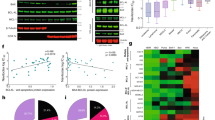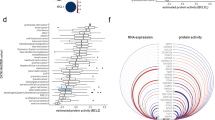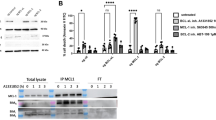Abstract
The expression of the BCL-2 family proteins, BCL-2, BAX, BCLXL and BAK have been determined in a panel of 12 human ovarian carcinoma cell lines encompassing a wide range in sensitivity to cisplatin. Whereas BAX, BCLXL and BAK levels did not correlate with sensitivity, there was a statistically significant inverse correlation (r = –0.81;P = 0.002) between growth inhibition by cisplatin and BCL-2 levels. In sublines possessing acquired resistance to various platinum-based drugs or across a panel of human ovarian carcinoma xenografts, there was no consistent pattern of BCL-2 expression. Two relatively sensitive lines (A2780 and CH1) have been stably transfected with bcl-2 and bclXL respectively and two relatively resistant lines (A2780cisR and SKOV-3) stably transfected with bax. Overexpression of BCL-2 in A2780 cells led to resistance to cisplatin compared to the vector control when assayed at 48 h post-drug incubation but a significant increase in sensitivity at 96 h. Relative rates of apoptosis at 48- and 96-h post-cisplatin exposure mirrored the growth inhibition. There was no significant difference in sensitivity of the pair of lines by clonogenic assay. No significant changes in chemosensitivity to a variety of DNA-damaging or tubulin-interactive agents were observed in the remaining transfected lines. Taken together, these results suggest that, in human ovarian carcinoma cells, high BCL-2 levels (either naturally occurring or through gene transfection) confers a trend towards sensitivity not resistance to platinum drugs. © 2000 Cancer Research Campaign
Similar content being viewed by others
Article PDF
Change history
16 November 2011
This paper was modified 12 months after initial publication to switch to Creative Commons licence terms, as noted at publication
References
Dive C and Hickman JA (1991) Drug–target interactions: only the first step in the commitment to a programmed cell death?. Br J Cancer 64: 192–196
Eliopoulos A, Kerr D, Herod J, Hodgkins Krajewski S, Reed J and Young L (1995) The control of apoptosis and drug resistance in ovarian cancer: influence of p53 and Bcl-2. Oncogene 11: 1217–1228
Herod JJO, Eliopoulos AG, Warwick J, Niedobitek G, Young LS and Kerr DJ (1996) The prognostic significance of Bcl-2 and p53 expression in ovarian carcinoma. Cancer Res 56: 2178–2184
Holford J, Sharp SY, Murrer BA, Abrams M and Kelland LR (1998) In vitro circumvention of cisplatin-resistance by the novel sterically hindered platinum complex AMD473. Br J Cancer 77: 366–373
Jones M, Siracky J, Kelland LR and Harrap KR (1993) Acquisition of platinum drug resistance and platinum cross resistance patterns in a panel of human ovarian carcinoma xenografts. Br J Cancer 67: 24–29
Jones NA, Turner J, McIlwrath AJ, Brown R and Dive C (1998) Cisplatin- and paclitaxel-induced apoptosis of ovarian carcinoma cells and the relationship between Bax and Bak up-regulation and the functional status of p53. Mol Pharmacol 53: 819–826
Kelland LR, Mistry P, Abel G, Loh SY, O’Neill CF, Murrer BA and Harrap KR (1992 a) Mechanism-related circumvention of acquired cis -diamminedichloro platinum(II) resistance using two pairs of human ovarian carcinoma cell lines by ammine/amine platinum (IV) dicarboxylates. Cancer Res 52: 3857–3864
Kelland LR, Jones M, Abel G, Valenti M, Gwynne JJ and Harrap KR (1992 b) Human ovarian carcinoma cell lines and companion xenografts: a disease oriented approach to new platinum anticancer drug development. Canc Chemother Pharmacol 30: 43–50
Lock RB and Stribinskiene L (1996) Dual modes of death induced by etoposide in human epithelial tumor cells allow Bcl-2 to inhibit apoptosis without affecting clonogenic survival. Cancer Res 56: 4006–4012
Ormerod MG, O’Neill C, Robertson D, Kelland LR and Harrap KR (1996) Cis-Diamminedichloro platinum (II)-induced cell death through apoptosis in sensitive and resistant human ovarian carcinoma cell lines. Cancer Chemother Pharmacol 37: 463–471
Reed JC (1997) BCL-2 family proteins: role in dysregulation of apoptosis and chemoresistance in cancer. In: Apoptosis and Cancer, Martin SJ (ed), pp. 64–97. Karger-Landes Systems: Basel
Yin DX and Schimke RT (1995) BCL-2 expression delays drug-induced apoptosis but does not increase clonogenic survival after drug treatment in HeLa cells. Cancer Res 55: 4922–4928
Author information
Authors and Affiliations
Rights and permissions
From twelve months after its original publication, this work is licensed under the Creative Commons Attribution-NonCommercial-Share Alike 3.0 Unported License. To view a copy of this license, visit http://creativecommons.org/licenses/by-nc-sa/3.0/
About this article
Cite this article
Beale, P., Rogers, P., Boxall, F. et al. BCL-2 family protein expression and platinum drug resistance in ovarian carcinoma. Br J Cancer 82, 436–440 (2000). https://doi.org/10.1054/bjoc.1999.0939
Received:
Accepted:
Published:
Issue date:
DOI: https://doi.org/10.1054/bjoc.1999.0939
Keywords
This article is cited by
-
Phyto-mediated synthesis of CuO nanoparticles using aqueous leaf extract of Artemisia deserti and their anticancer effects on A2780-CP cisplatin-resistant ovarian cancer cells
Biomass Conversion and Biorefinery (2024)
-
Overexpression of TRIM44 mediates the NF-κB pathway to promote the progression of ovarian cancer
Genes & Genomics (2024)
-
BCL-2 protein family: attractive targets for cancer therapy
Apoptosis (2023)
-
Study of anticancer effects of platinum levetiracetam and levetiracetam via cancer biomarkers genes expression on HepG2 cell line
Molecular Biology Reports (2023)
-
Anti-tumour activity of tivozanib, a pan-inhibitor of VEGF receptors, in therapy-resistant ovarian carcinoma cells
Scientific Reports (2017)



